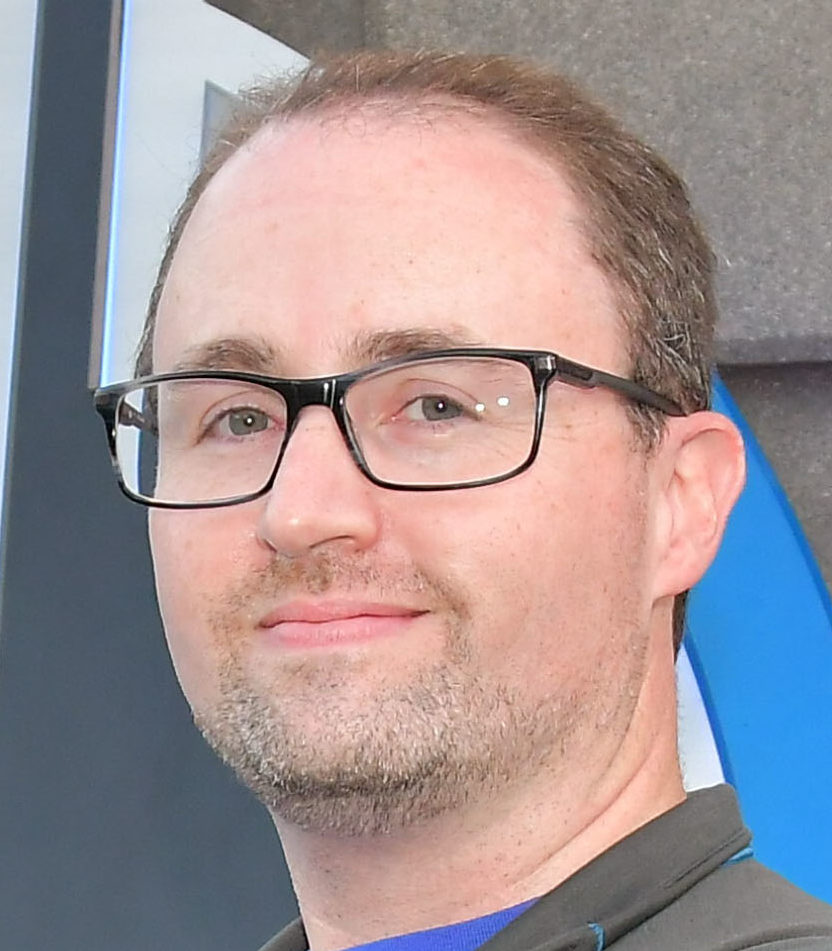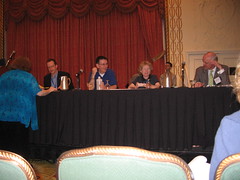This talk was broken up into three pieces – one each by Matthew Bejune (Assistant Professor of Library Science at Purdue University Libraries), Meredith Farkas (‘Queen of Wikis’ and Distance learning librarian at Norwich University), and Tim Spalding (founder of LibraryThing).
Matthew opened with a summary of his research into wiki use in libraries. The results will appear more formally in the 9/07 issue of ITAL. For his purposes, library wikis can be classified in one of four groups:
1. Collaboration between libraries
2. Collaboration between library staff (internal)
3. Collaboration between staff and patrons
4. Collaboration between patrons
Groups one and two combined make up about 76% of all library wiki use.
Some highlighted examples included the SJCPL subject guide wiki, the USC Aiken Gregg-Graniteville Library’s site (using a wiki as a full CMS), OCLC’s Wikid, and The Biz Wiki from Ohio University.
As we move forward with Wikis, Matthew highlighted some questions to keep in mind:
Why aren’t we more in category 3 or 4?
How might we enable patrons to build or modify a library’s information?
How will libraries next use wikis?
His own wiki (http://librarywikis.pbwiki.com/) has many more details.
Meredith took the stage next. Her presentation is available online at meredithfarkas.wetpaint.com
She stressed the need for knowledge management. All organizations need it to collect and maintain just how to do a task and share areas of expertise. Many libraries’ systems for this purpose are too informal right now. For example, scraps of paper with notes left at the reference desk can very easily disappear. A blog might work, but the reverse chronological listing makes it hard to locate an item in the long run.
Meredith also talked about user tagging as used in Ann Arbor District Library’s catalog – these tags are more familiar to users than the LCSH system. But, tagging needs a critical mass of tags applied to items to be of much use in making recommendations. Hennepin County’s catalog lets users create lists like on Amazon, and leave comments in the catalog. Worldcat is going to allow these lists too.
A great example of a community-focused wiki that Meredith showed is the RocWiki – a big guide to the city of Rochester, NY. (near where I grew up, incidentally) Users have asked and answered each others’ questions in discussion areas of the wiki. While this one isn’t run by a library, why couldn’t a library build something like this as a community service? It would enhance reference service too.
The Biz Wiki was brought up again, as an example of drawing on faculty expertise and what students have picked up.
But a Wiki is not an easy solution. It takes time to get buy-in, run training for staff, and then integrate it into an existing workflow. Also, I got a big kick out of this library wiki tech troubleshooting page.
Later, in Q&A Meredith mentioned that some moderation by authority is necessary for online communities. But it has to be done carefully to maintain a grassroots feel.
Tim Spalding’s presentation was jaw dropping. I’ve played with LibraryThing before, but only a little bit. I had no idea of how deep its current functionality goes. LibraryThing is now the second largest library catalog type system in the world.
It relies on “social cataloging” and the idea that knowledge is a conversation. A catalog itself is not a conversation, but is a tool to get you to it. LCSH helps start this process, but then users need to ascend.
The users do an amazing amount of cataloging work for librarything, probably without even realizing it. They combine multiple editions into one authority listing, write extensive author pages (making sure to clear copyright for any pictures of them), etc. By letting users apply tags of their own design, the resulting system is a bit more natural than LCSH – ‘cooking’ instead of ‘cookery’, for example. There are also tags for genres like chick lit and cyberpunk, which LCSH doesn’t cover. And even if LCSH were to add headings for these areas, there’s no guarantee that past written books would be classified with it retroactively.
Of course, tagging isn’t perfect. What if someone labeled The Diary of Anne Frank with an antisemitic tag? Well, it hasn’t really happened. But relatively useless and infrequently used tags for the book like “in belgium” or “historyish” can be ignored when only popular tags are shown. This relies on a critical mass of tags though, enough that the oddities can be declared mere statistical blips and ignored. Any new tagging system has this hurdle to overcome.
LibraryThing has some cool new functionality coming soon, including the ability to combine and subtract tags. For example, users will be able to search for books with the tags WWII and France, but without the tag Fiction. Also, the mass of tags that LibraryThing has accumulated will soon be made available to libraries (for a fee) for use in their catalog. Tim says it’ll work with any OPAC! Danbury Library is the first to take advantage of it. He’d also like to apply LibraryThing’s methodologies to articles soon. I think I’m going to give LibraryThing a more in depth look when I get home…

